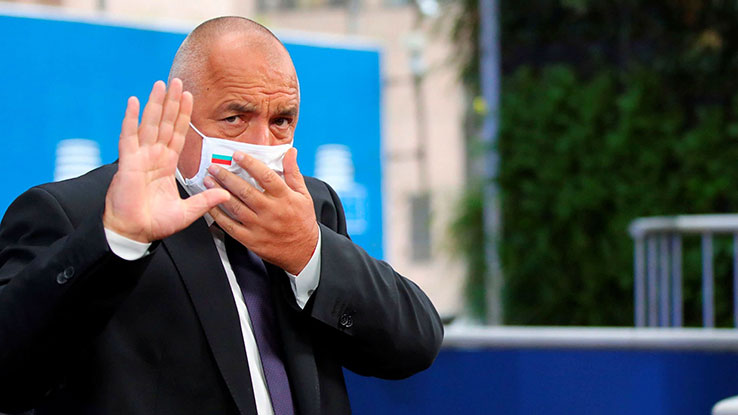Ljudmil Iliev
 While Skopje hopes that the upcoming elections in Bulgaria are one of the reasons for the firm stance of the government of Bojko Borisov, if you look deeper, the outcome of the elections in Bulgaria in any option will not soften the position of Sofia in terms of unblocking of the Macedonian European integration. Why is this the case? Because of the unified stance of the Bulgarian political parties that is based on the entrenched attitudes in the Bulgarian society towards the Macedonian question.
While Skopje hopes that the upcoming elections in Bulgaria are one of the reasons for the firm stance of the government of Bojko Borisov, if you look deeper, the outcome of the elections in Bulgaria in any option will not soften the position of Sofia in terms of unblocking of the Macedonian European integration. Why is this the case? Because of the unified stance of the Bulgarian political parties that is based on the entrenched attitudes in the Bulgarian society towards the Macedonian question.
In Bulgaria, the public rarely pays attention to national foreign policy. Frequent scandals in power and quarrels between political parties and frequent civil discontent attract the most attention. An example of this are the protests in front of Boyko Borisov's office, which were held for almost 6 months in 2020. Thousands of Bulgarians took to the streets regularly, demanding the resignation of Prime Minister Borisov and Chief Public Prosecutor Ivan Geshev because they believed they were both working for the interests of the country's business oligarchs. In the midst of these events, Bulgarian diplomacy could hardly attract the special interest of ordinary citizens.
The crucible of the issue at hand
The public in Bulgaria rarely pays attention to the national foreign policy. This attention is mostly attracted by the frequent scandals in the government and the quarrels between the political parties. Few know about the state diplomacy or show any interest in it. Therefore, the public waves caused by the crisis between Bulgaria and Macedonia in the last months of 2020 were really a big surprise. The media dedicate constant and significant attention to this topic. The Internet is literally flooded with analysis and comments on this issue. During a certain period this dispute between the two countries attracted even greater interest than the COVID-19 pandemic.
This raises the following question: why is the Bulgarian public so anxious right now when it comes to relations between Skopje and Sofia? Why was this excitement not present before 2017 when the Neighborhood Agreement was signed (which is a very important milestone for the two countries)? Why the prime ministers Bojko Borisov and Zoran Zaev said to their citizens three years ago that something good is happening and that the old quarrels will remain in the past? Now, suddenly, it turns out that the problems have not been resolved, that the concerns have not been calmed down and that the future of bilateral relations remains as vague and unpredictable as it was before the signing of the Agreement.
Suddenly, many questions arose about Macedonia to which the Bulgarian society had to find answers. What kind of people are Macedonians – an independent nation or ethnic Bulgarians who have lost their identity? What language is Macedonian – separate one or a Bulgarian dialect? What is the past and what is the future of Macedonia and how they fit into the past and future of Bulgaria? What is the role of Yugoslavia, Serbia, the Soviet Union and communism in the relations between our two countries? Those that were more liberal said: let’s leave the past to the historians – what matters is to build a future together in a united Europe. The more conservative ones also reacted: the past cannot be separated from the present and, if we cannot find a common language for it, what common future can we have?
The sociological opinion polls unequivocally show that the latter group dominates. The vast majority of Bulgarians want a principle agreement to be reached between Sofia and Skopje on negotiations for membership in the European Union. This position is further reinforced by the deep-rooted perception in the Bulgarian consciousness that the Macedonian political, cultural and scientific elite is hostile towards Bulgaria and that is why our country should receive guarantees that Skopje will comply with the Bulgarian understanding of history.
Vox populi, vox Dei
Such a consensus is something that can rarely be seen in the Bulgarian society, and the politicians cannot ignore it. This largely explains the strong position of the Government in Sofia on this issue. The prime minister Bojko Borisov is ready to risk in not being understood by other European leaders and also to undertake on himself the accusations that he is hampering the European integration of the Western Balkans – a cause he defended very actively during the Bulgaria presidency with EU in 2018. And the reason for his persistence is that, if he unconditionally supports the negotiating framework between EU and RN Macedonia, he risks provoking anger in the Bulgarian public opinion ahead of the parliamentary elections in March 2021, which his GERB party risks losing in one way or another due to the failure to deal with the pandemic.
 Source: ft.com
Source: ft.com
Secondly, there is the influence by the Deputy Prime Minister, Minister of Defense and leader of the Bulgarian party VMRO, Krasimir Karakachanov on the prime minister Borisov. Throughout his political career, Karakachanov claims that his main cause is preservation and revival of the Bulgarian national consciousness in Macedonia. Without that, his political formation, which has taken the name of the historical revolutionary organization VMRO, will be completely meaningless. Therefore, it was to be expected that Karakachanov rushed to obtain permission from the prime minister to interfere in the negotiations with Skopje. Bojko Borisov cannot afford to reject him because he needs the support of VMRO as his coalition partner in order to complete his term. In order to show that he respects his allies, Borisov shared the responsibility for the negotiations between Karakachanov and Bulgarian Foreign Minister Ekaterina Zaharieva. This has contributed towards strengthening of the government position and Karakachanov intends to use the crisis with Skopje and satisfy the nationalist voters in Bulgaria.
The Bulgarian opposition is “close” to the government
Public attitudes in the country have also forced the opposition political forces to take standpoints that are close to those of the ruling parties. This also goes to the Bulgarian Socialist Party (BSP) which is the most influential opposition force and has a significant chance of winning the parliamentary elections. The Socialists supported the decision of the government to freeze the opening of negotiations between EU and Macedonia. They criticized the authorities only for the late disclosure of the problems in the talks with Skopje. "We did sign an agreement for good neighborly relations and cooperation. This agreement must be respected. Has a joint commission been established to resolve the disputed issues between the two countries? Yes. Have they been resolved? No. Until they are resolved, there will be no solution to this issue". These are statements for the Bulgarian media given by the BSP President Kornelia Ninova. Vlado Buchkovski, the special envoy of Macedonia to Bulgaria, expressed a similar opinion.
Even more aggressive is the position of the “There is such people” party lead by the showman Slavi Trifonov. The surveys show that it will be a third political force on the next Bulgarian parliament. “The proposal for the Macedonians, ooops, sorry, Northmacedonians, is that for them to acknowledge their historical Bulgarian roots, we recognize the current situation, and the current situation is to recognize the Macedonian language and the Macedonian nation – this is the best proposal they can get. RN Macedonia will not get better compromise and if it refuses to come to terms with its historical Bulgarian roots it shall continue to be outside the European Union. That is all!” – was the harsh Facebook status of Trifonov. Thus, the showman, who relies on a strong populist political program, has unequivocally shown that he has no intention of making any concessions on this topic when he enters the Parliament.
The right “Democratic Bulgaria” coalition which will also be included in the future Parliament was attacked because it tried to “trade” with the common history of the two countries, such as recognition of the common past, in a moment in which Sofia is in a strong position. “…We run the risk of bringing the integration of the Republic of N Macedonia into a long-term dead end, which will only benefit professional Yugoslavs in Skopje and their mentors in Belgrade and Moscow, and we will look like some cavemen from the gunpowder cellar of Europe. Not only are we not solving the problem, but we are making it worse", said Hristo Ivanov, co-chairman of “Democratic Bulgaria”. Beyond the criticism of the government tactics, however, the attitude of the Democrats is not fundamentally different from that of other political parties. This can be seen from the measures that Ivanov proposed for resolving the crisis: regular joint sessions of the cabinets and parliaments in order to discuss the implementation of the Friendship Treaty; a “canon” of common persons and holidays, revision of history textbooks in North Macedonia, etc.
Among the larger political forces, only the Liberal Movement for Rights and Freedoms (DPS) shows a calm position. The party prudently avoids commenting on the topic inside Bulgaria – the movement is colloquially defined as a "party of the Bulgarian Turks" and therefore it away from such questions that provoke the nationalist sentiments. Ilhan Kjuchuk, a DPS member of the European Parliament, spoke on this topic. Recently, in a conversation with the Minister of Foreign Affairs of Macedonia, Bujar Osmani, he stated: "I believe that both sides will resume the constructive talks, because otherwise we see an alarming development of the situation, namely an increase in nationalism and hate speech. The understanding and mutual respect between our citizens will be the key to resolving the dispute." From his words, one can see the position of the DPS – careful and diplomatic.
Sofia will not relent
In Skopje, the hope is that after the parliamentary elections in Bulgaria, a new government will come to power that will be more favorable to their aspirations for membership in the European Union. Such expectations, however, are unrealistic. The views of the Bulgarian public on this issue are firm and unequivocal and, as can be seen from the review so far, there is no great political force in our country that will dare to ignore them, including the BSP.
It does not matter that SDSM of Zoran Zaev and BSP of Kornelia Ninova are related social democratic parties as well as the successors of the former communist parties in the two countries. This fact will force the Bulgarian socialists to be even more stubborn in the possible talks with Skopje. In Bulgaria, the former Communist Party is accused that it forcibly declared the people living in Pirin Macedonia as ethnic Macedonians in the 1940s in order to please Tito's Yugoslavia. That is why the BSP cannot afford to be lenient – otherwise it will be exposed to attacks by the anti-communist and nationalist parties in Bulgaria for betraying national interests, just like its predecessor.
From Bulgarian point of view, the crisis in the relations with RN Macedonia has become more of a domestic political issue rather than an interstate one. The ruling Bulgarian parties are unanimous in saying that Skopje is not fulfilling its obligations under the Neighborhood Agreement and therefore the Macedonian side should not be allowed to open the EU membership talks. Therefore, it is very likely that the next government in Sofia, regardless of who will be in it, will continue the general policy lines of cabinet of Bojko Borisov.
On top of that, with the end of the German presidency of the EU at the end of 2020, the current and future Bulgarian authorities have no particular incentive to pay attention to the negotiation process. This will be the case until the middle of 2021, when the presidency will be taken over by Slovenia – a former Yugoslav republic, which may show more sympathy for the Macedonian cause and will again put the issue on the EU agenda.
Even then, the resolving of the crisis will remain in the hands of the politicians in Sofia and Skopje. They have the difficult task of finding a compromise that will satisfy the citizens of Bulgaria and RN Macedonia, and will respond to the strategic interests of both countries and the EU. Unfortunately, there is no willingness on both sides of the border to make concessions, indicating that the crisis will last a long time.
Please refer to the Terms before commenting and republishing the content.
Note: The views and opinions expressed in this article are those of the author and do not necessarily reflect the views of the Institute of Communication Studies or the donor.


